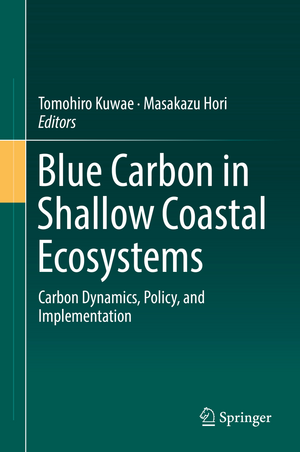Blue Carbon in Shallow Coastal Ecosystems: Carbon Dynamics, Policy, and Implementation
Editat de Tomohiro Kuwae, Masakazu Horien Limba Engleză Hardback – 14 sep 2018
| Toate formatele și edițiile | Preț | Express |
|---|---|---|
| Paperback (1) | 732.84 lei 6-8 săpt. | |
| Springer Nature Singapore – 11 feb 2019 | 732.84 lei 6-8 săpt. | |
| Hardback (1) | 1010.60 lei 6-8 săpt. | |
| Springer Nature Singapore – 14 sep 2018 | 1010.60 lei 6-8 săpt. |
Preț: 1010.60 lei
Preț vechi: 1232.45 lei
-18% Nou
Puncte Express: 1516
Preț estimativ în valută:
193.37€ • 202.44$ • 160.01£
193.37€ • 202.44$ • 160.01£
Carte tipărită la comandă
Livrare economică 05-19 aprilie
Preluare comenzi: 021 569.72.76
Specificații
ISBN-13: 9789811312946
ISBN-10: 981131294X
Pagini: 390
Ilustrații: XII, 373 p. 152 illus., 64 illus. in color.
Dimensiuni: 155 x 235 mm
Greutate: 0.75 kg
Ediția:1st ed. 2019
Editura: Springer Nature Singapore
Colecția Springer
Locul publicării:Singapore, Singapore
ISBN-10: 981131294X
Pagini: 390
Ilustrații: XII, 373 p. 152 illus., 64 illus. in color.
Dimensiuni: 155 x 235 mm
Greutate: 0.75 kg
Ediția:1st ed. 2019
Editura: Springer Nature Singapore
Colecția Springer
Locul publicării:Singapore, Singapore
Cuprins
1. Introduction.- Part 1: Carbon stock and flow at ecosystem scale – Carbon Storage.- 2. Backgrounds, Theory, Methods, and Seagrass case.- 3. Mangrove case.- 4. Seaweed case.- Part 2: Carbon stock and flow at ecosystem scale – Gas exchange.- 5. Backgrounds, Theory, Methods, and Seagrass case.- 6. Mangrove case.- 7. Tidal marsh case.- 8. Tidal flat case.- Part 3: Carbon stock and flow at estuarine and coastal scale.- 9. Seagrass carbon transport.- 10. Carbon dynamics in coral reefs.- 11. Carbon dynamics in urbanized waters.- Part 4: Policy and Implementation.- 12. Yokohama Blue Carbon.- 13. Future of Blue Carbon.
Notă biografică
Dr. Tomohiro Kuwae is the Group Head of the Coastal and Estuarine Environment Research Group, Port and Airport Research Institute (PARI), National Institute of Maritime, Port and Aviation Technology, Japan. He received his Master’s and Doctoral degrees in Applied Biosciences from Kyoto University and was an Adjunct Professor at Kumamoto University. His research interests include biogeochemical cycling in shallow coastal waters, especially carbon dioxide sequestration and carbon storage in shallow coastal ecosystems; fundamental ecology such as food-web structure and function; and the conservation, restoration, and creation of coastal ecosystems.
Dr. Masakazu Hori is a Senior Researcher at the Coastal Macrophyte Ecosystem Research Group, National Research Institute of Fisheries and Environment of Inland Sea (FEIS), Japan Fisheries Research and Education Agency (FRA). He received a Ph. D. in Marine Environments and Resources from the GraduateSchool of Fisheries Science, Hokkaido University. He worked as a Research Fellow at the University of Tokyo and an adjunct instructor at Hiroshima University. He specializes in community and ecosystem ecology, including plant–animal interactions, food-web analyses, ecosystem services, and social-ecological systems in shallow coastal ecosystems.
Textul de pe ultima copertă
This book presents a comprehensive and innovative understanding of the role of shallow coastal ecosystems in carbon cycling, particularly marine carbon sequestration. Incorporating a series of forward-looking chapters, the book combines thorough reviews of the global literature and regional assessments—mainly around the Indo-Pacific region and Japan—with global perspectives to provide a thorough assessment of carbon cycling in shallow coastal systems. It advocates the expansion of blue-carbon ecosystems (mangroves, seagrass meadows, and salt marshes) into macroalgal beds, tidal flats, coral reefs, and urbanized shallow waters, demonstrating the potential of these ecosystems as new carbon sinks. Moreover, it discusses not only topics that are currently the focus of blue-carbon studies, i.e., sedimentary carbon stock and accumulation rate, but also CO2 gas exchange between the atmosphere and shallow coastal ecosystems, carbon storage in the water column as refractory organic carbon, and off-site carbon storage. Including highly original contributions, this comprehensive work inspires research beyond the specific regions covered by the chapters. The suite of new concepts and approaches is refreshing and demonstrates that blue-carbon research is indeed a vibrant new field of research, providing deep insights into neglected aspects of carbon cycling in the marine environment. At the same time the book provides guidance for policy makers to deliver benefits to society, for example the inclusion of blue carbon as a carbon offset scheme or the Nationally Determined Contribution (NDC) in the Paris Agreement, and also for building resilience in coastal socio-ecosystems through better management. This book is intended for all those interested in the science and management of coastal ecosystems.
Caracteristici
Reviews and provides comprehensive global information on state-of-the-art science, technology, policy, and international frameworks related to blue carbon Presents case studies of blue-carbon science, technology and practical applications, such as the carbon offset credit in Japan Proposes future needs for blue-carbon initiatives
